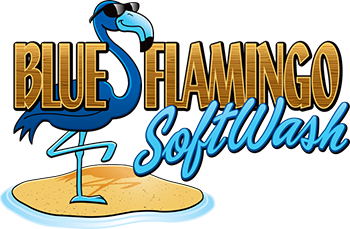Soft Washing vs. Painting or Staining
Professional Exterior Cleaning Services in The Miami, FL Area
Thinking about your next exterior paint job?
The time has come to touch up a fence, stain a deck, or paint the exterior of your home. Your home’s exterior looks dirty and old. You’ve started to search for local painters and prepare yourself for spending thousands of money on a paint job.
But before you tackle these projects, check the state of your house’s exterior. Fortunately, there is another way to make your house look great again, and it is called soft wash.
Sure, there are pros and cons that you can consider. If you’re still undecided on what to do, we’re here to help. Is it better to opt for soft washing? Or should you start painting your walls to restore the property’s appearance? Keep reading to get some more insight.
Of course, painting your house is what contractors do. It is usually done when you want to remodel your home. There’s nothing wrong with it unless you’re doing it because your house is dirty. It is definitely reasonable to look for the right solution in fixing your problem.
Why Soft Washing is Better than Painting or Staining
Less Expensive
Soft washing can save you thousands of dollars than you would spend if you consider painting. Soft washing uses only water and the cleaning solution applied to the surface and materials of your house is clean and good looking. The amount of money you would end up spending while painting can be used to soft wash the home more than ten times. Surprisingly, the results you can get after washing are almost the same as painting (if not better).
Faster Process
Unlike painting which takes a lot of time since you have to mix the paint and wait until the walls dry off, soft washing is only slightly different from routine house cleaning. You only need to wait for a few minutes for the walls to dry off.
Less Complicated Process
Having your house painted is a big task. The painter has to set up, things need to be moved to prevent paint spill and everything needs to be done in a very organized and planned manner if you would like to have good results. Soft Wash however can be done almost as easily as washing your house with a hose.
Eliminates Unpleasant Smells
Soft washing removes any smell. Ideally, it removes existing algae, molds and kills mildew at the molecular level. In this process, your home ends up getting a fresh feeling and stays cleaner for an extended time. Painting, on the contrary, leaves your house with an unpleasant smell that takes time to disappear. Mostly it becomes hard to paint a house and sleep inside on the same day.
The best choice for your property!
When trying to determine whether soft washing vs painting or staining is the right approach to completing your project, speaking to us at Blue Flamingo SoftWash will help you make an informed decision.
If you simply want to spruce up your home, upgrade, or aim to have a change in your home’s exterior, you can directly paint the walls. On the other hand, if you’ve been seeing accumulated dirt, dust, grime, mold on your walls, it’s best to put off repainting and have it cleaned first.
Now, how should you clean your walls? Most households hear two options: soft washing and pressure washing. Let’s dive into their differences.
What is Pressure Washing?
Pressure washing, as its name implies, is the channeling of a water supply through a high-pressure pump to force water out of a hose and nozzle at extremely high speed. It is most often used to forcibly clean hard surfaces of debris and stains when other cleaning methods fall short.
What is Soft Washing?
Soft washing has been part of the professional cleaning industry for almost 20 years, but it is quickly growing to become part of the repertoire of nearly every professional cleaning contractor today. The method has something for everyone, it is also kinder to the environment than most other cleaning methods, due to how it utilizes water more efficiently.
Exterior Painting and Staining
Preparing the surface will ensure a long-lasting paint job. It’s important to soft wash before painting your house exterior. Before you paint or stain, a soft washing professional will clean the surface and remove the oxidation layer so that the new paint/stain coating can easily stick.
When restoring the appeal of a house, it is better to consider soft wash as the first option rather than painting services. But why is that so? Here are a few reasons to look at.
Can You Paint Over Dirty Siding? Why Shouldn’t You Paint Over Dirty Siding?
What Happens If You Paint A House Without Soft Washing It?
It’s important to have a clean house exterior before painting. Even if your house exterior appears clean, you should still give it a thorough check because things aren’t always as they seem. It’s always safer to wash it prior to painting, and one way to do so is by pressure washing houses.
Schedule Your Cleaning Now & Get A Free Estimate
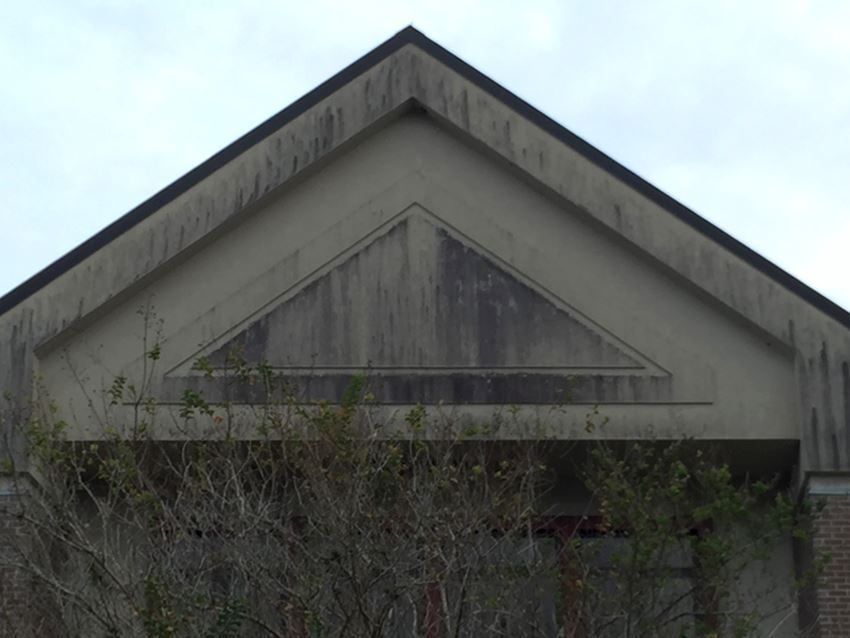
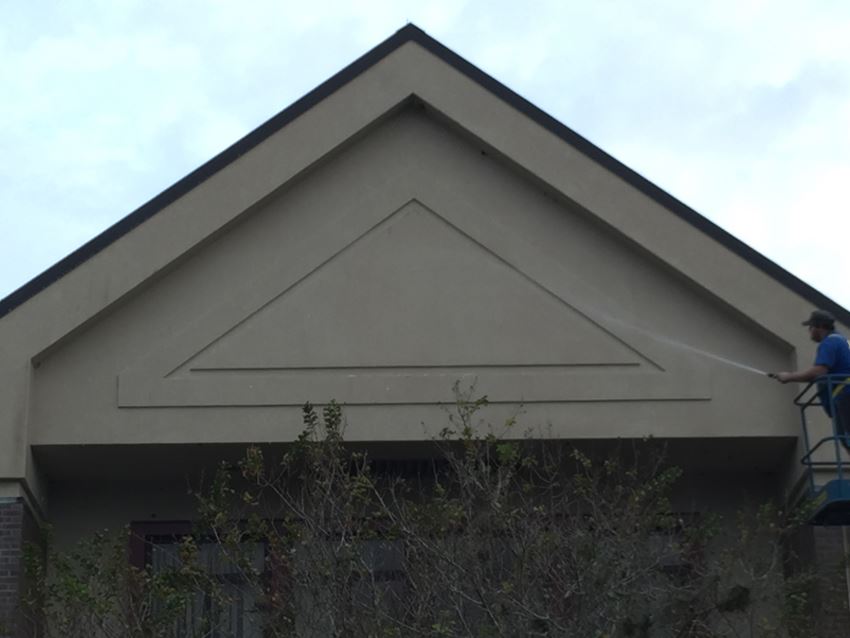
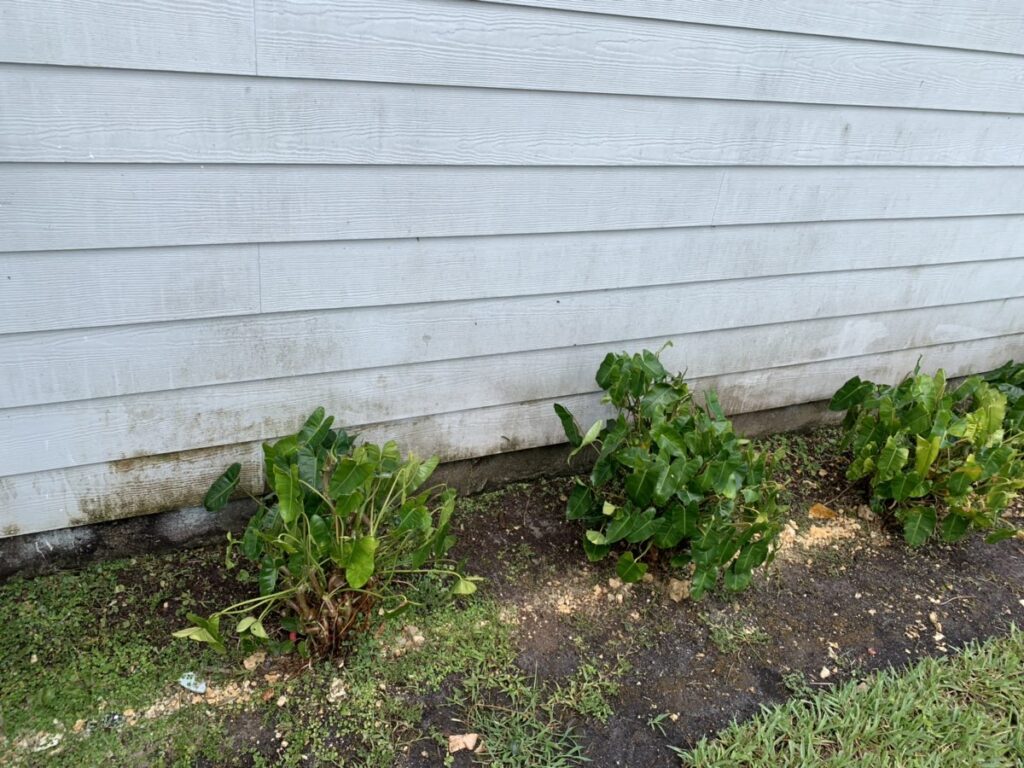
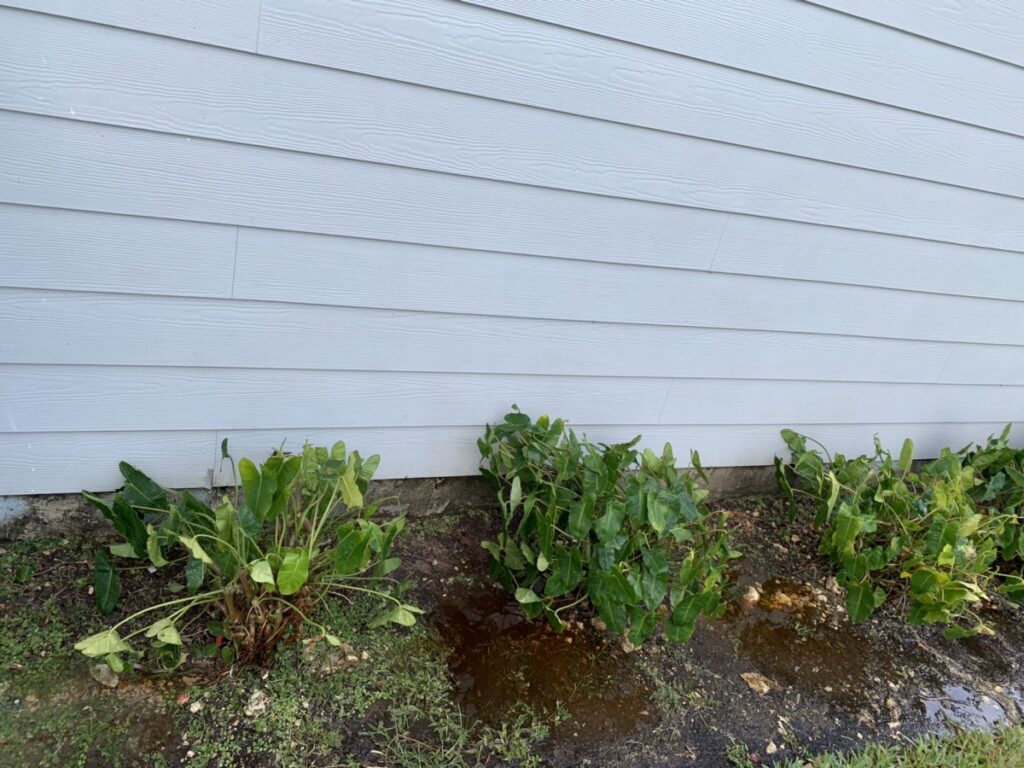
Soft Washing Results
In comparison to its competition, Blue Flamingo SoftWash incorporates a safer, biodegradable, and phosphate-free solution to sanitize, penetrate bacteria, and eradicate the root cause to produce a long-lasting, deep clean result.
Take a look at our gallery to see the roofs renewed by being soft washed with 100% eco-friendly chemicals.
How Do I Prepare My House For Soft Washing?
Can You Power Wash A Painted House?
No. We do not recommend power washing a freshly painted house. The high pressure can cause the paint to bubble, crack, or peel. Instead, we prefer the soft wash approach, as it is the safest, easiest, and most effective way to keep your house clean.
The detergents used in our cleaning process quickly break down mold, algae, and other harmful contaminants. Other cleaning solutions offer gentle and biodegradable options that work well for your garden and flowerbeds.
How Long After Soft Washing Can You Paint?
Generally, you can paint your house the very next day. Make sure you do a touch test to verify that the surface is dry. Additionally, you do not want to wait more than 30 or 60 days to paint after cleaning.
Precautions: Why Shouldn’t I Pressure Wash My House Myself?
By now, it’s clear that you must clean before painting your house’s exterior. Contacting a professional for help is recommended.
Pressure washing is more dangerous than many homeowners realize.
Yes, getting your own pressure washer is exciting. However, DIY pressure washing comes with hidden risks. High water pressure can cause damage in just a few seconds.
Potential Dangers of Pressure Washing
1. Physical Injuries and Plant Damages
This one is (hopefully) a no-brainer. Never pressure wash humans, pets, or plants. The force of water coming from a pressure washer can cause physical harm — even penetrate the skin — and will most certainly destroy your plants.
When you pressure wash appropriate surfaces, always wear safety glasses to protect your eyes from debris. Additionally, the pressure can cause serious injury if the spray is directed at a person.
2. Fire Risk And Electrical Shocks
Obviously, you run the risk of causing serious damage when using power washers near any electrical outlets on the exterior of your home as water and electricity don’t mix. Though outdoor lighting can withstand rain and other weather elements, you should not pressure wash these fixtures. You’ll risk forcing water into cracks and causing damage.
3. Toxic Fumes
Many homeowners have been seriously injured by running pressure washers in an environment with poor ventilation.
You might walk around your home with a pressure washer, then decide to run the pressure washer in your garage to clean the pavement. Unfortunately, running a gas-powered pressure washer in a closed space can lead to carbon monoxide poisoning.
Never use any equipment powered by a gasoline engine inside a building – or even in a partially enclosed space. Always leave your pressure washer outside and away from the air intake.
4. Water Damage
You can also easily cause damage to your home exterior surfaces by using the wrong nozzle or pressure level. Water can collect in your attic, walls, and floors if you are not careful. The force from the power wash can blow holes in the siding and strip off the paint.
5. Shredded Window Screens
The high pressure can break windows too, giving you a major headache and an expensive window to replace.
6. Splintered Or Cracked Wood
Wooden decks and fences are highly vulnerable to severe damages when you subject them to power washing. The pressure that the pressure washer exerts on the deck surface leads to splintering. This problem mainly occurs when there is a section on your deck where the woods show signs of splitting apart.
7. Loose And Dented Siding
A high-powered pressure wash could dent aluminum and vinyl siding, so learn the proper techniques first if you plan on using a pressure washer to clean your siding.
While it’s possible to pressure wash wood siding correctly, you can also force water up and under the exterior surface if your water pressure is set too high. If water gets under the siding it can damage insulation, and electrical wiring, and even spur mold growth.
8. Loose Brickwork From Cut Mortar
A pressure washer will damage weathered brick houses and other landscaping surfaces with mortar. Any loose material, especially on older structures, will be blasted away by pressure washing on a high setting.
9. Damages On Surfaces That You Want to Stay Painted
A pressure wash will easily chip paint off most surfaces, so only use a low-pressure flow of water to wash painted items such as a porch floor or painted outdoor furniture.
10. Chemical Damages
Power washing usually utilizes chemicals to attain the highest levels of cleanliness. These chemicals can fall on several other surfaces that may react adversely with the reagents. A point in case is where the pressure washer directs the chemicals on flowers and shrubs in your lawns around that deck, causing them to wither or dry up. Washing the decks under uncontrolled pressure causes splashing, which comes as a critical cause of such accidental damage to the landscape.
If you are thinking about power washing your house, deck, and fence yourself, be sure you have the tools and knowledge necessary to avoid damage. Many things can go wrong when power washing. That’s why we never recommend using pressurized water yourself. It’s always better to call an experienced professional. But if you insist on doing things yourself, there are some things you ought to know. When you pressure wash the exterior of your home, be cautious of the following dangers:
1. Don’t Use Pressure Washers to Strip Paint
When you pressure wash the exterior of your house before a paint job, the goal is to clean it, not to strip the paint away. Most pressure washers are strong enough to take off the paint, but it’s not recommended to use the tool to strip off the paint.
For the best results, you should separately strip old paint with a scraper, heat gun, or sander after you finish pressure washing. Aside from that, using it to strip off the paint can easily damage the surface beneath, especially wood and vinyl surfaces.
2. Be Wary of Etching
Concrete and brick may be durable, but there’s a risk of etching when pressure washers are used on them. That said, the damage it can potentially cause on vinyl and cedar is much worse.
To avoid etching, maintain a good distance from your home when spraying — you don’t want to crack or chip your surfaces. Stand at least 2 to 6 feet away, depending on your machine’s PSI levels. For extra caution, opt for a fan spray nozzle instead of a stream nozzle, which can tear your siding.
3. Don’t Inject Water
Outdoor floor cleaning with a high pressure water jet in a straight angle. Spraying at an angle is equally important. Don’t use a pressure washer upward from a low angle, as doing this can inject water into the siding boards. This can drench the insulation and sheathing of your interior walls, resulting in water damage in the long run. Make sure to spray at a right angle or a bit downward. Be aware of your surroundings as well to avoid getting water into vents, doors, windows, and other openings.
4. Don’t Pressure Wash Electrical Panels, Meters, and Light Fixtures
Do not pressure wash any fixtures housing electricity, even those on the exterior of your home or in your yard. Though built to withstand a rainstorm, pressure washing can force water into cracks and crevices and cause damage and costly repairs.
Whether you’re preparing to repaint or simply want to ensure your home looks polished and clean, Blue Flamingo SoftWash can help!
Reach out to schedule your free quote today!
Our Clients Love Us... Here's Why!
We are passionate about always going the extra mile for you.
Get in Touch Today!
Use our quick contact form or give us a call for a free quote then schedule a time for us to come out and make your life cleaner and easier.
1. GET YOUR QUOTE
Ready to restore your exterior surfaces? Fill out one of our easy forms or call today and one of our specialists will get you a free estimate. Contact us today!
2. GET SCHEDULED
We specialize in the removal of mold, mildew, algae, dirt and other stains from residential, commercial and multi-unit property exterior surfaces. Schedule a time to allow one of our professionals to make your property exceptionally clean!
3. RELAX
Sit back, relax and focus on the things that really matter, like running your business. Our highly skilled team will be more than happy to arrive ready to improve your image and decrease your stress.
